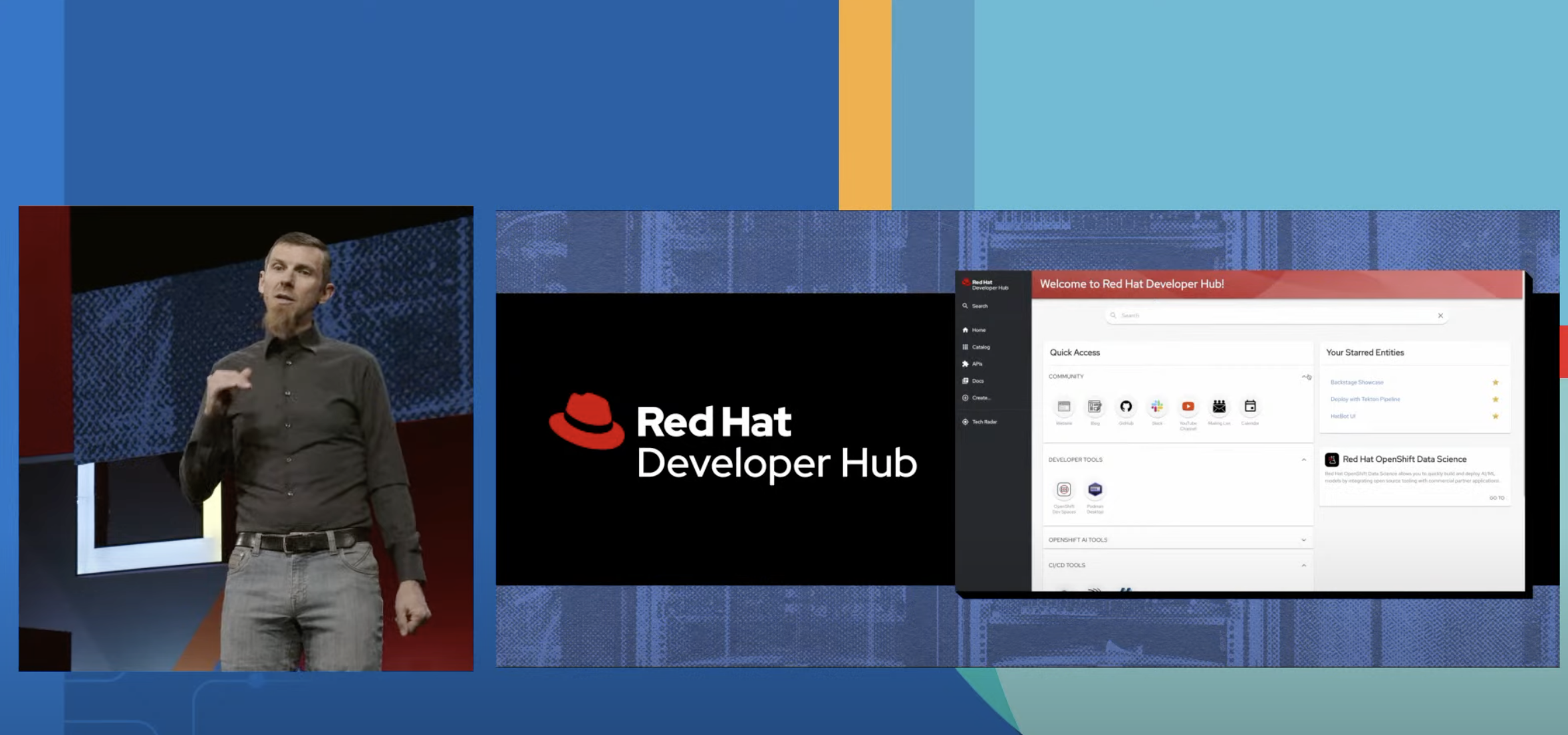Red Hat Developer Hub aims to help developers build better apps faster
The portal was built to standardize the developer experience while maximizing the return on existing investments


Red Hat has unveiled its Red Hat Developer Hub as a fully-fledged portal to ‘supercharge’ the developer experience.
The product is a former open source project from Cloud Native Computing Foundation (CNCF), called Backstage.io, and is now the first standalone, enterprise-grade version of it.
Red Hat Developer Hub, according to the open source software firm, unifies and standardizes the developer experience, maximizes productivity, and enables individuals and organizations to make the most of existing investments and skill sets.
The new portal - unveiled at this week’s Red Hat Summit in Boston - is unified and open, and essentially offers developers an internally curated and managed toolset to ensure they can quickly and easily turn their software visions into successful reality.
It’s all about maximizing what enterprises have already invested in at a knowledge and financial level as well as increasing velocity and reducing friction, the company claimed.
“This helps developers focus on crafting beautiful code and not the plumbing underneath"
Chris Wright, CTO at Red Hat
“Red Hat Developer Hub adds support for key Red Hat developer plug-ins to drive a more consistent user experience without compromising on that application velocity. The platform also contains validated templates," said Chris Wright, CTO at Red Hat.
"These provide opinionated, pre-architected approaches to building and deploying software from creation to production.
Get the ITPro daily newsletter
Sign up today and you will receive a free copy of our Future Focus 2025 report - the leading guidance on AI, cybersecurity and other IT challenges as per 700+ senior executives
“Developer Hub gives IT organizations a developer platform built on open source innovation with that stability, that support, that reliability that you’ve come to expect from our hybrid cloud technologies. Developer Hub also builds on skills that IT organizations have already through integration with Red Hat OpenShift.
“That’s the best news. It’s building on skills and technologies that you already have. This maximizes what you know without having to sacrifice application innovation to maintain operations.”
RELATED RESOURCE

Designing the ideal digital work experience for the next generation of innovators
What users want, why it's critical to give it to them, and how the whole organization can benefit
Wright also cited Salesforce’s 2022 ‘Great Resignation’ research, which revealed the majority (76%) of firms feel the cognitive load needed to get to grips with new software architectures is just too high.
As a result, productivity and sense of achievement decrease rather than increase.
Developer Hub aims to redress the balance here, according to Wright.
“As IT resources grow ever more scant and demand for new applications just keeps growing, these platforms grow more daunting. If these platforms aren’t maintained at the speed of development, then CIOs can look forward to fragmentation, complexity, and worse. The use of unverified code that can find its way into production…
“Adding a net new platform all but guarantees a new learning curve, which equates to hours lost in training that you really don’t have.”
With a view to removing barriers and accelerating innovation and results-driven performance, the Red Hat Developer Hub:
- Offers a single view of all the tools and resources available for developers as they look to boost productivity.
- Enables users to self-serve and ensure best practice across the board.
- Maintains the proper levels of security and governance.
Wright said that the focus was on taking “differentiated applications to market as quickly and as painlessly as you can".
What’s more, Wright acknowledged the unsung IT heroes outside of the developer world, saying it was those people that kept “developer workflows rolling smoothly, with the right tools, the validated environments, and on-demand services".
Ultimately, Developer Hub should free up developer bandwidth in a number of ways.
“This helps developers focus on crafting beautiful code and not the plumbing underneath,” Wright added.
Maggie has been a journalist since 1999, starting her career as an editorial assistant on then-weekly magazine Computing, before working her way up to senior reporter level. In 2006, just weeks before ITPro was launched, Maggie joined Dennis Publishing as a reporter. Having worked her way up to editor of ITPro, she was appointed group editor of CloudPro and ITPro in April 2012. She became the editorial director and took responsibility for ChannelPro, in 2016.
Her areas of particular interest, aside from cloud, include management and C-level issues, the business value of technology, green and environmental issues and careers to name but a few.
-
 Bigger salaries, more burnout: Is the CISO role in crisis?
Bigger salaries, more burnout: Is the CISO role in crisis?In-depth CISOs are more stressed than ever before – but why is this and what can be done?
By Kate O'Flaherty Published
-
 Cheap cyber crime kits can be bought on the dark web for less than $25
Cheap cyber crime kits can be bought on the dark web for less than $25News Research from NordVPN shows phishing kits are now widely available on the dark web and via messaging apps like Telegram, and are often selling for less than $25.
By Emma Woollacott Published
-
 AWS expands language support for Amazon Q Developer
AWS expands language support for Amazon Q DeveloperNews AWS has expanded support for languages in Amazon Q Developer, making it easier for developers to code in their first language.
By Nicole Kobie Published
-
 Red Hat just made three big changes to its developer hub – here’s what you need to know
Red Hat just made three big changes to its developer hub – here’s what you need to knowNews Red Hat has unveiled a raft of upgrades for Red Hat Developer Hub (RDHD), including support for a local version as well as new analytics.
By Nicole Kobie Published
-
 AI was a harbinger of doom for low-code solutions, but peaceful coexistence is possible – developers still love the time savings and simplicity despite the allure of popular AI coding tools
AI was a harbinger of doom for low-code solutions, but peaceful coexistence is possible – developers still love the time savings and simplicity despite the allure of popular AI coding toolsNews The impact of AI coding tools on the low-code market hasn't been quite as disastrous as predicted
By Ross Kelly Published
-
 ‘We’re trading deep understanding for quick fixes’: Junior software developers lack coding skills because of an overreliance on AI tools – and it could spell trouble for the future of development
‘We’re trading deep understanding for quick fixes’: Junior software developers lack coding skills because of an overreliance on AI tools – and it could spell trouble for the future of developmentNews Junior software developers may lack coding skills because of an overreliance on AI tools, industry experts suggest.
By George Fitzmaurice Published
-
 GitHub's new 'Agent Mode' feature lets AI take the reins for developers
GitHub's new 'Agent Mode' feature lets AI take the reins for developersNews GitHub has unveiled the launch of 'Agent Mode' - a new agentic AI feature aimed at automating developer activities.
By Ross Kelly Published
-
 Red Hat launches Build module as part of partner program refresh
Red Hat launches Build module as part of partner program refreshNews Red Hat has announced new changes to its partner program, including the launch of a new 'Build' module and go-to-market support capabilities.
By Daniel Todd Published
-
 Shadow AI is creeping its way into software development – more than half of developers admit to using unauthorized AI tools at work, and it’s putting companies at risk
Shadow AI is creeping its way into software development – more than half of developers admit to using unauthorized AI tools at work, and it’s putting companies at riskNews Enterprises need to create smart AI usage policies that balance the benefits and risks
By Solomon Klappholz Published
-
 Python just brushed past JavaScript to become the most popular programming language on GitHub – and a key factor is that AI developers love it
Python just brushed past JavaScript to become the most popular programming language on GitHub – and a key factor is that AI developers love itNews The meteoric rise of Python shows no sign of stopping
By Nicole Kobie Published